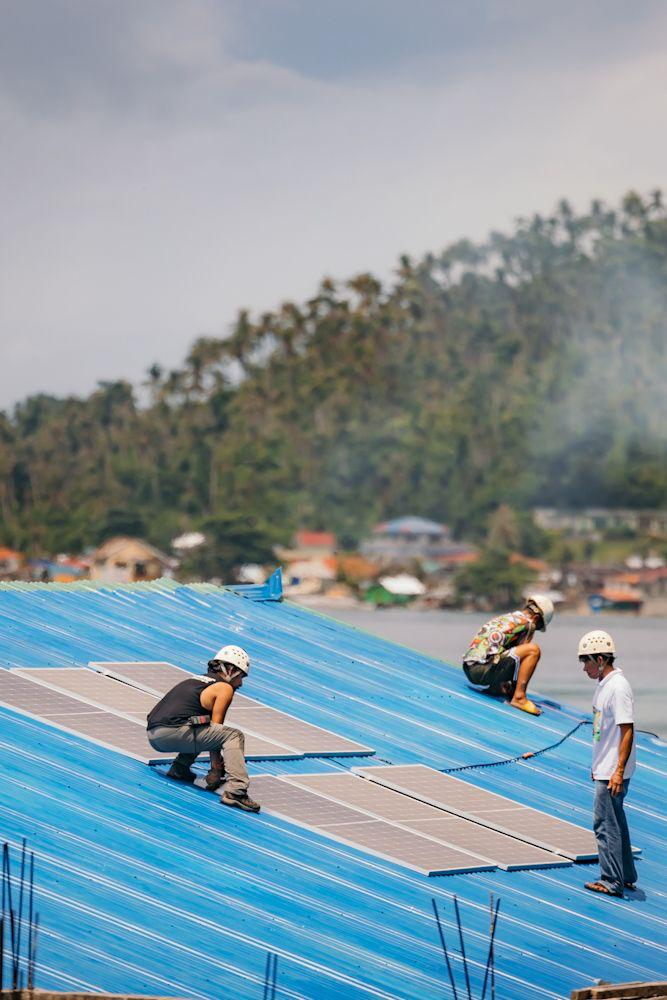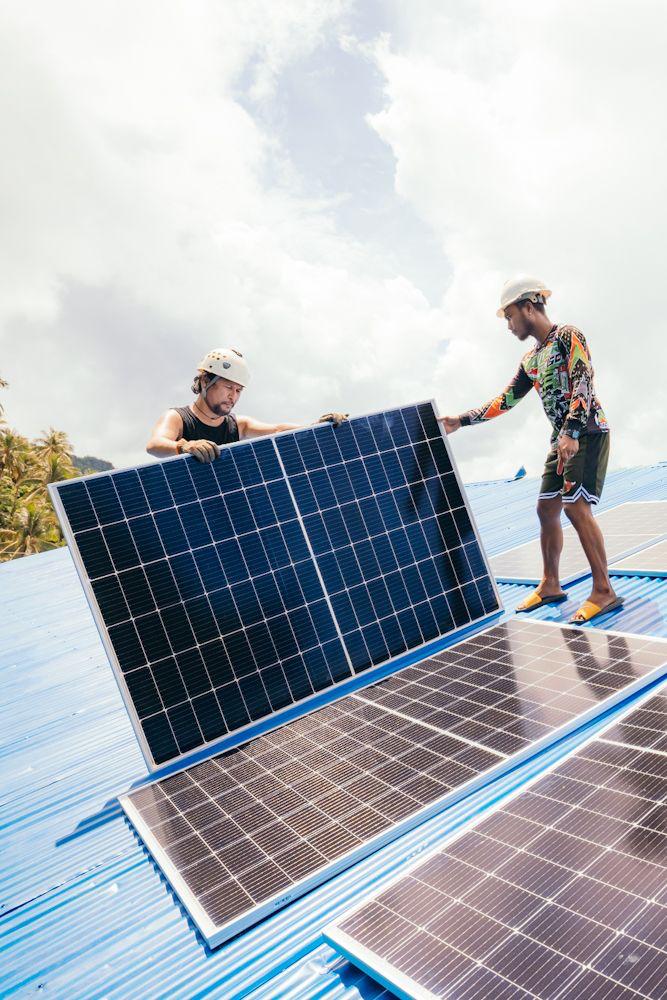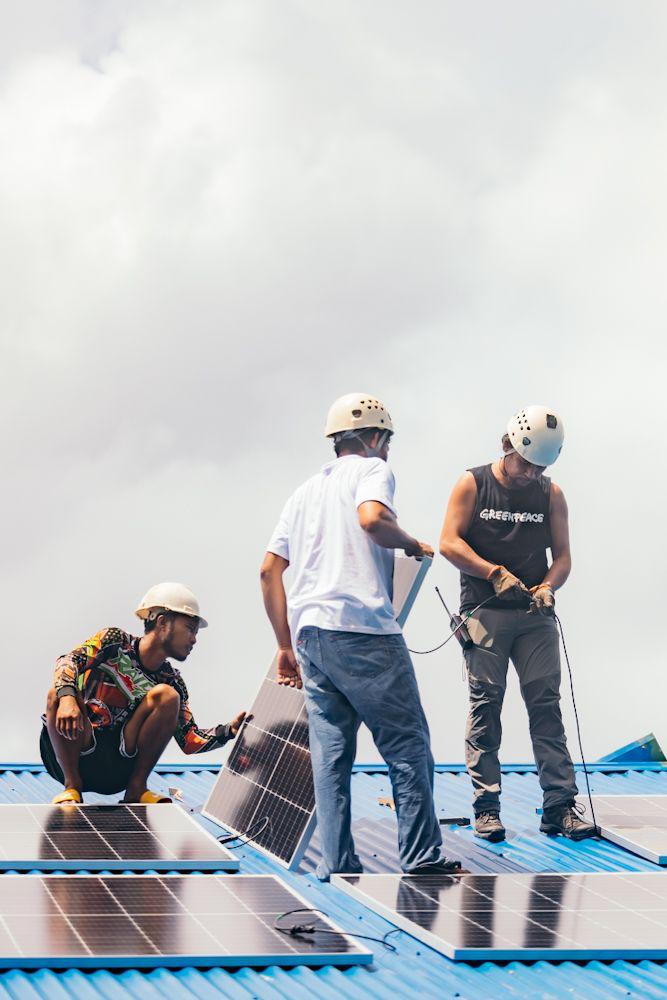DINAGAT ISLANDS, Philippines (15 July 2022) — Residents of Brgy. Coring, Basilisa, Dinagat Islands, with the support of environmental groups, installed solar panels in their barangay gymnasium as part of STY Odette-related recovery efforts. This collaboration among CORA Philippines, Greenpeace Philippines, and the local government of Brgy. Coring aims to demonstrate that renewable energy (RE) is the most sensible energy source for climate-vulnerable, as well as island communities.
During and after the onslaught of Odette (international name: Rai) late last year, Brgy. Coring’s diesel-powered electric generator failed to restore power in the area, disrupting efforts towards recovery and resumption of livelihood. Barangay officials believe the additional 4,800 watts of electricity from the solar panels will prove beneficial to a community struggling to get back on its feet.
“Mas naglisod mi pagbangon gikan sa kawad on nga kahimtang sa among katilingban nga walay maayo nga kuryente. Tungod kay naa mi sa gamay nga isla, mas lisod asa mi makakuha ug enerhiya, maglisod pod mi dawat ug ayuda, mas grabe ang kahimtang namo sa panahon nga naay bagyo. Nahadlok ug nalisang mi pag agi sa Bagyong Odette. Hapla jud mi ug magsugod mi sa sinugdanan.” said Brgy. Coring resident Tessie Japay. “Karun nga naa na mi Solar Power sa among isla, mas paspas ang among paglambo, mohayag ang among lugar ug makamenos na mi sa mga gastos. Dali ra pod sya gamiton.”[1] see translation below
Beyond off-grid installation, Greenpeace says the Philippines must invest massively in utility scale RE, particularly solar and wind, in order to usher in the just transition to clean and safe energy. In a 2020 report[2], the group said that investment in wind and solar impacts job creation and other baseline economic indicators positively, as well as the transformation of energy systems. The group highlights how renewable energy investment is an ideal and relatively immediate vehicle for economic development, an essential tool for fast recovery from economic crises such as Covid-19, and a means to build better performing, more resilient economies. Greenpeace is calling on the Philippine government to increase its RE target to at least 50% RE by 2030, a figure that is highly achievable and can be delivered mostly by solar power.


The people of Brgy. Coring has joined the youth climate advocates’ call for the Philippine government to expedite the shift towards renewable energy instead of having the country rely on dirty and dangerous energy sources such as nuclear and fossil gas. Greenpeace cites the Commission on Human Rights’ final report on the National Inquiry on Climate Change (NICC) as an additional basis for why the government should prioritize the transition to RE.[3]
“Investments in clean energy will protect communities,” said Greenpeace Campaigner Virginia Benosa-Llorin. “The findings of the NICC report recognize that a just transition to RE and an end to fossil fuel dependence is necessary and urgent if we are to avoid the worst impacts of climate change and protect Filipinos’ lives and rights. As climate impacts continue to affect the most vulnerable sectors – like the families in Brgy. Coring – it is imperative that our new government tap the country’s massive potential for RE development to provide safe, sustainable, reliable and affordable energy for Filipinos.”

###
Note to Editors:
This solar installation of the environmental and climate advocacy groups is the second in their ongoing efforts to promote a just transition away from fossil fuel dependence. Another solar installation was conducted in Mantatao Island, Municipality of Calape, Bohol.
[1] Translated to English: “Recovery efforts in our community are being hampered by the lack of reliable sources of electricity. Because we live on an island and it’s hard to access electric power, it becomes harder for aid to come in and to ensure our well-being after storms. Now that there are solar panels installed in our area, it’s easier for us to recover, especially as these panels are cheap and easy to use.”
[2] Southeast Asia Power Sector Scorecard. 2020. Greenpeace. https://storage.googleapis.com/planet4-southeastasia-stateless/2020/09/8f7592a7-gpsea-southeast-asia-power-sector-scorecard-report-170920-fv7.pdf?utm_campaign=fossil-fuels&utm_source=pressrelease&utm_medium=referral&utm_content=press-release&utm_term=scorecard
[3] The world’s first Climate Change and Human Rights Inquiry, filed by Filipino typhoon survivors, communities, and civil society organizations at the Commission on Human Rights on September 22, 2015, sought to hold carbon majors accountable for human rights harms arising from the climate crisis. The final report on the Inquiry was released by the CHR on May 6, 2022. The findings are a victory for the millions of Filipinos whose fundamental rights are being impacted by the corporations behind the climate crisis, as they show that there are legal grounds for communities to hold corporations accountable for undermining climate action. Read the full text of the final report here: https://chr.gov.ph/wp-content/uploads/2022/05/CHRP-NICC-Report-2022.pdf
Media Contact:
Karl Santos
Communications Campaigner (deployed in Dinagat islands)
Greenpeace Philippines — [email protected] | +639176758883
Maverick Flores
Communications Campaigner (in Manila)
Greenpeace Philippines — [email protected] | +639176211552
